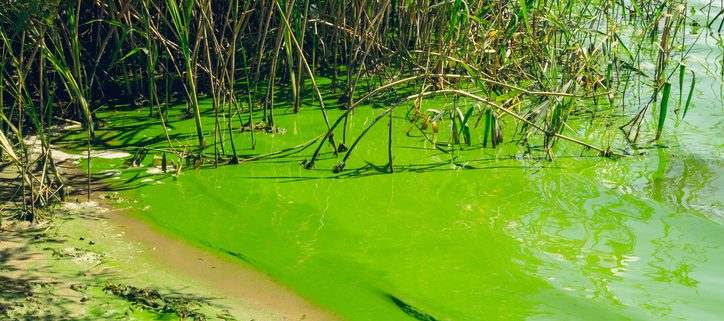Algae Can Poison Your Dog
Dog owners have reported this summer that their pets became fatally ill after swimming in freshwater lakes and ponds, apparently after ingesting water laden with toxic blue-green algae.
Intense blooms have led to swimming bans from lakes in the Pacific Northwest to the entire Mississippi seacoast, to Lake Hopatcong, New Jersey’s largest lake. Algal blooms tend to thrive in high temperatures and after heavy rains carry fertilizer runoff and sewage into waterways.
The health threats to animals range from skin rashes to neurological problems. The blooms can release toxins that can cause liver damage, lead to respiratory paralysis or produce other fatal conditions. The danger drew national attention in recent days after a woman in North Carolina lost her three dogs — Harpo, Abby and Izzy — after they had gone swimming in a pond.
Cyanobacteria, the main organisms that produce the toxins that make the freshwater blooms harmful, can cause ailments in people, but dogs are more susceptible because they ingest them, said GreenWater Laboratories, which tests water samples for the toxins.
Sign Up for the Morning Briefing
Get what you need to know to start your day, delivered to your inbox.
Sometimes the algae look like grains of floating green sand or scum. They can go undetected by dog owners if they lurk under the water’s surface or attach to plants. Wind can blow algae from one area into another that had previously looked clear.
While the sight and odor of algae repels humans, animals sometimes lap up the water, ingest floating pieces of algae or snap at floating algal balloons. They could fall fatally ill after licking their wet fur. Toxic algae can also dry up into crusts onshore, where dogs might nibble on them.
Brittany Stanton took her 2-year-old golden retriever, Oliver, on Aug. 3 to Lady Bird Lake in Austin, Tex., where he jumped off their kayak into the water.
In a Facebook post, Ms. Stanton said he collapsed after getting out of the water and died at the veterinarian’s office. “It only took one hour from the time we left the water for Oliver to breathe his last breath,” she wrote.
The next day, the city of Austin advised pet owners to keep their animals out of the lake because of the potential presence of harmful algae. On Friday, it said the advisory remained in effect after tests confirmed a neurotoxin from algae had been found in one area called Red Bud Isle.
Morgan and Patrick Fleming of Marietta, Ga., took their Border collie, Arya, to Lake Allatoona, about 35 minutes north of Atlanta, on Saturday, a local television station reported on Monday. The animal became ill and died from what a veterinarian said was “most likely” an algal toxin, it reported.
“It happens every single year in the U.S. and around the world,” Val Beasley, a professor of veterinary, wildlife and ecological toxicology sciences at Pennsylvania State University, said on Monday.
“A lot of times, the neurotoxins will kill the animal before they can get to the veterinarian,” he said. “This time of year is when you have the most numbers of cases and people are out and about with their animals and the conditions are ripe for the cyanobacteria to grow.”
He said that there were no nationwide figures of dog deaths from the poisoning.
Melissa Martin, the owner of the three dogs in North Carolina, said Harpo jumped into a pond in Wilmington, N.C., on Thursday.
“He just splashed around in it a little bit,” she said. A few times, he put his face under the water as it he were “bobbing for apples.”
When he got to shore, he apparently got Abby and Izzy, who had stayed out but were muddy, wet with the pond water, she said. When they went home, Ms. Martin started to give Harpo a bath when she heard her wife shriek from the yard.
Abby was having a seizure. “Her back legs were trembling. Her body was in the shape of a C,” she said. “Burning to the touch.”
Ms. Martin raced Abby to an animal emergency hospital. Their veterinarian was not available to comment on Monday, but Ms. Martin said she was asked whether their other dogs had been around water.
When she said they had been, she was told, “Get your other dogs here right now.” All three animals had been infected she said the vet told her.
“I told him he was such a good boy and he had done so much,” Ms. Martin said, describing her last moments with Harpo, a therapy dog, just before he and the other two dogs died. “He put his paw on my arm.”



